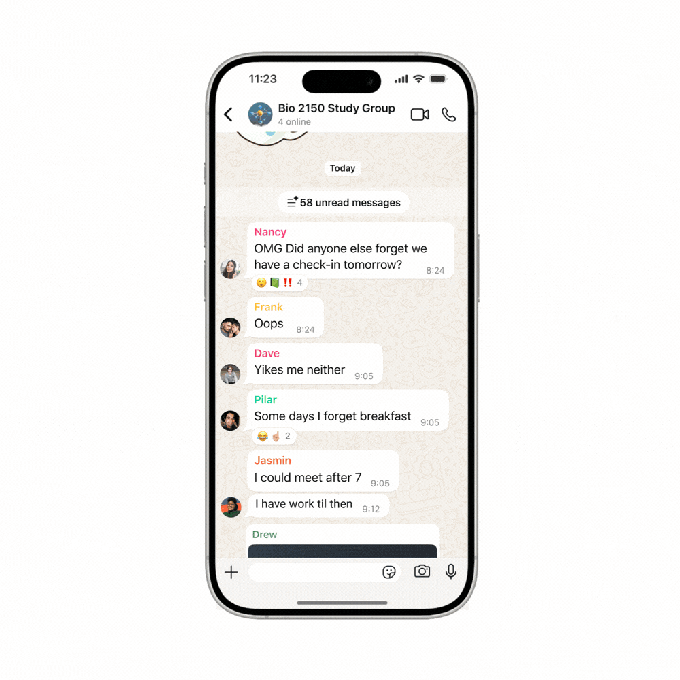How Meta just solved the group chat overwhelm problem without breaking encryption and why this changes everything

You know that sinking feeling when you open WhatsApp after a few hours away and see “47 new messages” in your family group chat? Or when you return from vacation to find your work channels flooded with conversations you somehow need to catch up on? If you’re nodding along, you’re about to love what Meta just announced.
On Wednesday, Meta revealed that WhatsApp is getting AI-powered message summaries a feature that promises to solve our collective message overload problem while maintaining the app’s legendary privacy standards. But this isn’t just another AI gimmick. It’s a glimpse into how artificial intelligence can enhance our digital lives without compromising the security we’ve come to expect from our most personal communications.
What WhatsApp’s AI Summaries Actually Do
Picture this: You wake up to find your phone buzzing with notifications from multiple group chats. Instead of scrolling through dozens of messages trying to piece together what happened while you slept, WhatsApp’s AI can now generate a concise summary of the key points and decisions made in your absence.
The feature works exactly as you’d hope. When you have unread messages in a chat, WhatsApp shows a small icon indicating that AI summaries are available. Tap it, and Meta AI processes your unread messages to create a personalized summary that only you can see. Your chat partners won’t know you’ve used the feature, and they can’t see your private summary.
What makes this particularly clever is how seamlessly it integrates into existing user behavior. We’re already conditioned to look for unread message indicators — now that same visual cue can trigger a time-saving AI feature.
But here’s where it gets interesting from a product design perspective: the feature is opt-in and turned off by default. This isn’t Meta trying to push AI on users who don’t want it. Instead, it’s positioned as a helpful tool for those who choose to use it.
The Privacy Innovation That Makes It All Possible
The most impressive aspect of WhatsApp’s new AI summaries isn’t the summarization itself — it’s how Meta managed to implement AI features without breaking WhatsApp’s end-to-end encryption. This technical achievement deserves more attention than it’s getting.
Meta calls this “Private Processing technology,” and it represents a significant breakthrough in privacy-preserving AI. Here’s how it works: instead of sending your messages to Meta’s servers for AI processing (which would break encryption), the AI analysis happens locally on your device or through encrypted channels that prevent Meta from ever seeing your actual messages.
“Message Summaries uses Private Processing technology, which allows Meta AI to generate a response without Meta or WhatsApp ever seeing your messages or the private summaries,” Meta explained in their announcement.
This approach solves one of the biggest challenges facing AI integration in secure messaging apps. Users want smart features, but they don’t want to sacrifice privacy for convenience. Traditional AI implementations require sending data to servers for processing, which creates privacy risks and breaks encryption models.
Meta’s solution keeps the AI processing separate from message storage and transmission, maintaining WhatsApp’s security guarantees while enabling new functionality. It’s a template for how other secure communication platforms might implement AI features without compromising their core privacy promises.
Why This Matters Beyond WhatsApp
The implications of privacy-preserving AI extend far beyond message summaries. If Meta can successfully implement AI features that respect encryption and user privacy, it opens the door for a new generation of intelligent communication tools that don’t require users to choose between convenience and security.
Consider the possibilities: AI-powered language translation that works entirely offline, smart reply suggestions that never leave your device, or even advanced spam detection that doesn’t require scanning message content on remote servers. The Private Processing approach could enable all of these features while maintaining user trust.
This development also puts pressure on competitors to match Meta’s privacy standards. Google Messages, Telegram, Signal, and other messaging platforms will likely face user expectations for similar privacy-preserving AI features. The bar for secure AI integration just got higher across the entire industry.
From a business perspective, this move demonstrates Meta’s commitment to differentiating WhatsApp through privacy leadership rather than racing to add flashy AI features that compromise user security. It’s a strategic choice that could pay dividends as privacy concerns continue to influence user platform selection.
The Rollout: Measured and Strategic
Meta is taking a deliberately cautious approach to this rollout. The feature is initially available only in the United States with English language support, expanding to more countries and languages later in 2025. This measured rollout suggests Meta is prioritizing getting the privacy and functionality right before scaling globally.
The company has also positioned this as building on AI technology introduced in April, indicating a longer-term AI integration strategy rather than a rushed response to competitive pressure. This timeline suggests thoughtful development focused on user value rather than headline-grabbing feature announcements.
For users wanting to try the feature, it will be accessible through Settings > Chats, though the exact menu structure wasn’t fully detailed in Meta’s announcement. The company appears to be maintaining its characteristic user interface simplicity even as it adds sophisticated AI capabilities.
What This Means for the Future of Digital Communication
WhatsApp’s AI summaries represent more than a convenient new feature — they signal a fundamental shift in how we might interact with our digital communications. Instead of being overwhelmed by information, we could soon have AI assistants that help us process, prioritize, and respond to messages more effectively.
The success of this feature could accelerate development of other AI-powered communication tools: meeting transcripts that highlight action items, email threads that surface key decisions, or even social media feeds that summarize important updates from friends and family.
More importantly, Meta has demonstrated that AI enhancement doesn’t require sacrificing privacy. This proof of concept could influence how other technology companies approach AI development, potentially leading to a new standard where privacy-preserving AI becomes the expectation rather than the exception.
The next few months will be crucial for determining whether users actually want AI assistance with their personal communications, and whether Meta’s privacy-first approach resonates with WhatsApp’s massive user base.
The Bottom Line
Meta’s introduction of AI-powered message summaries to WhatsApp represents a significant moment in the evolution of digital communication. By solving the technical challenge of implementing AI features without compromising encryption, Meta has created a template for privacy-preserving artificial intelligence that could influence the entire tech industry.
For users, this means finally having a solution to message overload that doesn’t require sacrificing the privacy protections that make WhatsApp trustworthy. For the industry, it demonstrates that the choice between AI innovation and user privacy is a false dichotomy — with the right approach, we can have both.
As this feature rolls out globally throughout 2025, it will be fascinating to see whether other platforms follow Meta’s lead in prioritizing privacy-preserving AI, and whether users embrace AI assistance in their most personal digital spaces.
The future of messaging isn’t just about connecting people — it’s about helping them stay connected without being overwhelmed. WhatsApp’s AI summaries might just be the first step toward that more manageable digital future.
Ready to try WhatsApp’s new AI features when they become available in your region? Share your thoughts on privacy-preserving AI in the comments below, and follow for more insights on how technology is reshaping digital communication.
This article was rewritten with the aid of AI
At Techsoma, we embrace AI and understand our role in providing context, driving narrative and changing culture.













